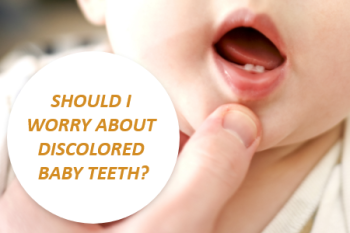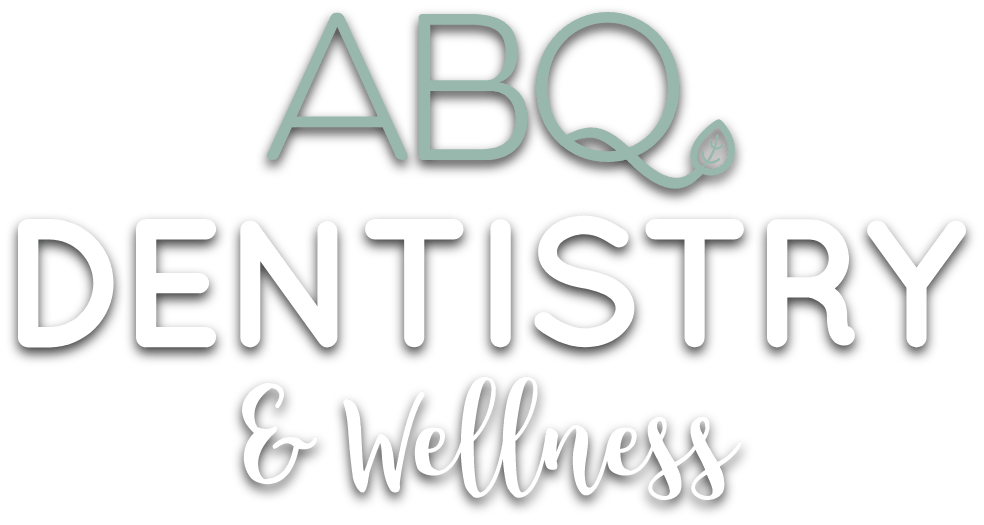Community
Should You Worry about Discolored Baby Teeth?
 Baby teeth, also called primary teeth are an important part of your child’s development. Teeth help children chew nutritious foods and help with language and speech development. Baby teeth are also a sign your little one is growing. First teeth typically erupt between 6 months and a year. While teething is no fun, eating new foods and hearing new sounds are all part of growing up! But, what happens if you notice your child’s baby teeth are discolored? Maybe you see a white spot, or the tooth starts to look gray. When should you contact Dr. Shamaine Giron at ABQ Dentistry & Wellness about discolored baby teeth?
Baby teeth, also called primary teeth are an important part of your child’s development. Teeth help children chew nutritious foods and help with language and speech development. Baby teeth are also a sign your little one is growing. First teeth typically erupt between 6 months and a year. While teething is no fun, eating new foods and hearing new sounds are all part of growing up! But, what happens if you notice your child’s baby teeth are discolored? Maybe you see a white spot, or the tooth starts to look gray. When should you contact Dr. Shamaine Giron at ABQ Dentistry & Wellness about discolored baby teeth?
Baby Teeth, the Basics
The American Dental Association explains babies are typically born with 20 teeth that begin to erupt around 6 months and the last teeth come in around 33 months.
Children lose the baby teeth, to be replaced with permanent teeth usually between the ages of 6-12. While baby teeth are temporary, they are important to healthy development and should be cared for just like permanent teeth. Some of the primary functions of baby teeth include:
- Speech development
- Chewing nutritious foods
- Smiling
- Holding space for permanent teeth
When baby teeth are lost or pulled too early, it can negatively impact these important functions. It’s important that your child see the dentist about 6 weeks after the eruption of their first tooth and before the age of 1.
What might cause discolored baby teeth?
If you notice your child’s teeth start to look discolored, it may be a sign of a problem. The most common causes of discoloration are listed below.
- Tooth decay
Baby teeth can get cavities, just like adult teeth. If you notice white spots or dark spots on your child’s teeth, it might be decay. Decay can be caused by on-demand feeding or falling asleep with a baby bottle in the mouth. You can also pass the bacteria that causes decay to your child, so be careful not to wash pacifiers in your mouth or share utensils.
2. Fluorosis
Fluorosis is a condition that appears as faint white lines on the teeth. It is caused by an excess of fluoride. If you have fluoridated water and you use it to mix your baby’s formula, your child may be at higher risk. Be careful to follow the American Dental Association’s recommendations for fluoride use and children to help prevent too much fluoride.
3. Illness
If your child was born with hyperbilirubinemia or too much bilirubin in the blood, their teeth may come in with a slight yellow or green shade. While uncommon, it is important to be aware of if your child experienced prolonged hyperbilirubinemia and or was premature.
4. Medication use
The antibiotic Tetracycline has been linked to stained teeth. If the mother uses it during pregnancy, or if the child is prescribed the treatment, it can stain both primary and permanent teeth.
5. Poor oral hygiene
One of the most common causes of discolored baby teeth is linked to poor oral care. If children are not brushing and flossing, plaque can build up, causing discoloration. Most of the time this discoloration is removed when the child brushes well. Make sure you follow the ADA recommendations for oral hygiene in kids.
6. Injury to the teeth or mouth
Kids are active! If they fall down or otherwise get injured they can easily chip their teeth. If the trauma impacts the inside of the tooth you may notice it turn dark, gray, or red. Damage done to the blood vessels causes discoloration. It may clear up on its own, but seeing your dentist after any oral trauma is important.
While some discoloration of baby teeth is harmless, you always want to check with your doctor and dentist just to make sure. If you notice a change, play it safe and call ABQ Dentistry & Wellness.
The content of this blog is not intended to be a substitute for professional medical advice, diagnosis, or treatment. Always seek the advice of qualified health providers with questions you may have regarding medical conditions.










